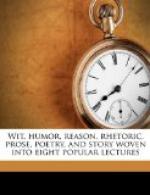I now turn from young men to parents and say, use every means possible to make safe the way of your boys. Some years ago in one of our cities, after a lecture in which I appealed to parents, a leading merchant of the city said: “I wish I had heard that lecture years ago.”
“You never used liquor?” I said.
“No, but I am responsible for its use in my family. I am a Methodist, and a total abstainer. In my employ I had a number of clerks, and let it be known I would not allow any of them to drink even moderately. One day a man came to my store with a paper in his hand and said: ’I want to set up a saloon on the next block and I am getting signers to my petition. I am one of your customers; you know me and know I will keep an orderly place.’ I said to myself, ’if he doesn’t sell others will and we need the revenue anyway,’ so I signed the petition. A few months later I chanced to see my youngest boy and one of my clerks coming out of the door of that saloon. Soon after when they entered the store I called them into my office and said: ’Young men, did I see you coming out of a saloon, and had you been taking a drink in there?’ When they admitted they had, I said to my son: ’Did I ever set such an example for you to follow?’ He answered: ’No, father, but you signed that man’s petition to set up the saloon; whom did you expect him to sell to? Did you sign it for him to sell to other fathers’ sons and not yours?’ I realized as never before the wrong I had done, not only to my own son, but to every father’s son to whom that saloon-keeper would sell if they had the money to pay for liquor. I said: “Forgive me, my boy. Promise me you will never enter a saloon again and I promise never to sign a petition or vote to have a saloon-keeper sell to anybody’s boy!”
But it was too late; that boy went to ruin and carried his old father to financial ruin with him. The store was sold and the father went on to a little farm in Missouri, where he died a disappointed, grief-stricken man. He was a good man and a kind father, but he did not realize the full meaning of the warning, “whatsoever ye sow, that shall ye also reap.” Fathers, be careful of your example. Your sons think they can safely follow where you lead. Could the turf break above the drunken dead; could they come back to earth in their bony whiteness to testify to the cause of their ruin, how many would point to the old sideboard filled with all kinds of liquors, to father’s moderate use of strong drink, or his vote for the saloon at the ballot box.
Too often the careless indulgence of mothers is responsible for the ruin of their sons. If mothers were as watchful of their sons as of their daughters, the magic chain of mother love would be far more binding to their boys. There are homes in this city where at night you can hear the mothers say to servants: “Are the clothes in off the line; did you bring the broom and the pitcher from the porch; are the blinds all down; are the girls in bed; is everything in order for the night?” No, mothers, everything is not in order. Your girls are safe, the windows and doors are locked, but your boys are on the outside with night keys in their pockets, to come in at midnight from God only knows where. The double standard reaches too often back into the home.




